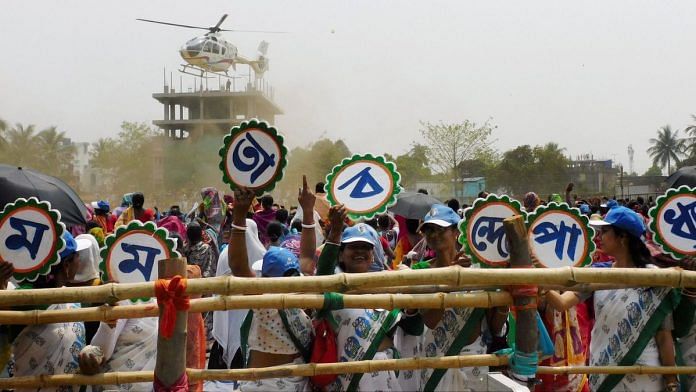New Delhi: Maharashtra and Punjab have copped the most criticism for India’s worsening Covid situation but it is three poll-bound states that have seen significant increases in daily cases and positivity rates since the announcement of elections in February.
Elections are on in West Bengal, Tamil Nadu, UT Puducherry, Kerala and Assam, and it’s the first three that are witnessing a spike in Covid numbers.
Between 26 February, when elections were announced, and 30 March, the country saw a 224 per cent rise in daily positives while the test positivity rate increased from 2.13 per cent to 5.22 per cent.
Daily positives in West Bengal rose by 190 per cent since the announcement even as live coverage of election rallies of all parties show how lax adherence is to Covid-appropriate behaviour. The test positivity rate in the state tripled during this time.

In Tamil Nadu, daily positives increased 386 per cent — from 481 cases on 26 February to 2,342 now. The positivity rate also rose from 0.9 per cent to 2.8 per cent.

In Puducherry, daily positives have risen by over five times — from 20 to 115 while the positivity rate, which was at 0.9 per cent is now dangerously close to the 5 per cent mark.
This mark shows that tests are not sufficient to detect the real extent of spread of an infection in the population, according to the World Health Organization.

Also read: BMC gears up to fight Mumbai Covid surge with more tests & more beds, says worst yet to come
‘All crowds lead to rise in infections’
While the figures are still fairly low, especially in comparison to Maharashtra, where last week the positivity rate breached the 23 per cent mark, the fact remains that the elections are a crucial factor in the breach of Covid protocol that the Centre says has been one of the principal reasons for the second surge.
Cabinet Secretary Rajiv Gauba is all set to chair a meeting with states Friday to discuss the worsening Covid situation.
On Tuesday, during the weekly briefing, NITI Aayog Member (Health) V.K. Paul had said that the situation is going from “bad to worse”.
However, in multiple media interactions, the health ministry has carefully sidestepped questions about the prudence of holding elections at a time when the SARS-CoV2 virus is clearly making a comeback.
Replying to a question a few weeks ago, Union Health Secretary Rajesh Bhushan had said: “The Election Commission has brought out guidelines for holding elections during the pandemic and they have been in place since before the Bihar elections.”
Tamil Nadu Principal Secretary (Health) J. Radhakrishnan, however, told ThePrint: “All crowds lead to rise in infections. We have seen clusters from religious congregations, in February the surges happened because of family gatherings where masking was lax. In Thanjavur, we had clusters from educational institutions. In Chennai and Coimbatore, it was from technology institutes.”
He added: “It would be naive to say elections would not cause spread. That is why we have told district and election officials to be vigilant. We have also appealed to political parties.”
Kerala and Assam are exceptions
Two states that have bucked this trend of rising Covid cases during the election heat are Assam and Kerala. The latter has turned the situation around — from being one of the high burden states to one where the positivity rate has dipped from 5.4 per cent to 4 per cent.
The daily positives in the state came down from 3,671 on 26 February to 2,389 on 30 March. This is contrary to the events in October 2020, when cases had surged due to rising political activity ahead of local body elections towards the end of the year.

Assam achieved the rare distinction of reporting zero cases on 30 March. It had reported 34 on 26 February.

Dr Dileep Mavlankar, director, Indian Institute of Public Health, Gandhinagar said given the fact that we still do not understand many aspects of how the virus spreads, it would have been preferable to avoid rallies.
“My sense is that elections can be held but not rallies. But I see officials saying it’s the ground staff that needs to implement Covid protocol. My sense is that cases will increase but to be fair we do not understand how the virus spreads. Farmer protests have happened for four months and cases are rising only now. There was no increase after the Bihar elections too,” he told ThePrint.
Also read: Maharashtra’s worst-hit Amravati confirms disturbing trend — Covid is moving to rural areas




A small correction: Assam 53 cases on 30th March.